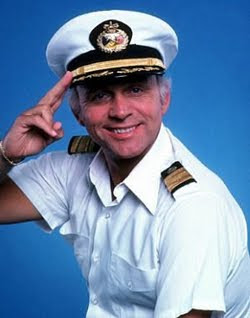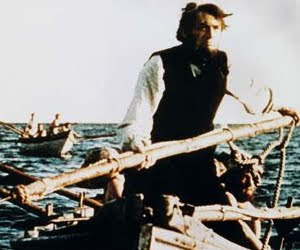 I have no doubt that we will conclude the summer semester successfully. We won't rip open our hull on some behemoth problem in Titanic-like fashion, nor will a black hole of indecision catapult us into trouble that only Captain Kirk-style leadership will help us escape. Because in reality, all we have lost is our Captain Stubing of Love Boat fame. Connie valued smooth cruises from Point A [the start of a new semester] to Point B [common course outcomes], and then back to port so that our passengers ... um, students ... could disembark, having had such a good experience that they would book a new cruise ... uh, register for the next semester ... to start the fun all over.
I have no doubt that we will conclude the summer semester successfully. We won't rip open our hull on some behemoth problem in Titanic-like fashion, nor will a black hole of indecision catapult us into trouble that only Captain Kirk-style leadership will help us escape. Because in reality, all we have lost is our Captain Stubing of Love Boat fame. Connie valued smooth cruises from Point A [the start of a new semester] to Point B [common course outcomes], and then back to port so that our passengers ... um, students ... could disembark, having had such a good experience that they would book a new cruise ... uh, register for the next semester ... to start the fun all over.Connie had a high threshold for boredom [as most administrators must, their days filled with long meetings and the same student and faculty complaints]. I don't remember one single time during her tenure as our leader that we "rocked the boat" in an attempt to innovate student learning or faculty development. Her attitude reflected the current culture at my institution. No one here is interested in carving out a new post-secondary niche for the college [as the place was when it opened 30-odd years ago] or building its reputation [as we already have a pretty good one]. No, we value safe waters, a steady, measured pace, a pleasant ride for those "passengers" on board.
 Before Connie, we had Captain Ahab at the helm. This dean chased technology as her white whale. She believed that computers could solve all of the problems associated with our department—they would make students write better, teach second-language students to master English faster, and relieve the paper grading burdens of faculty. Just as Melville's Ahab didn't understand Moby Dick, mistaken in his belief that the whale had eaten his leg as a personal insult [not while making an instinctual, self-protecting bite], our Ahab didn't really understand technology and its limitations.
Before Connie, we had Captain Ahab at the helm. This dean chased technology as her white whale. She believed that computers could solve all of the problems associated with our department—they would make students write better, teach second-language students to master English faster, and relieve the paper grading burdens of faculty. Just as Melville's Ahab didn't understand Moby Dick, mistaken in his belief that the whale had eaten his leg as a personal insult [not while making an instinctual, self-protecting bite], our Ahab didn't really understand technology and its limitations.When other departments were putting single computer-projector combinations into classrooms so that faculty could liven up instruction with PowerPoint presentations and full-screen movie clips or web pages, our Ahab was chasing bigger, flashier prey, entire rooms filled with machines to run software pushed by slick sales reps. The only problem was that no one—not the professors who taught the classes or the students along for the ride—could use those programs effectively. Even I threw up my hands in disgust, declaring the software techno-glitz with no real substance, after Ahab flattered me into a semester of freshman composition in one of those rooms. In three short years, the computers were obsolete—low-end models that came "free" with the ridiculously expensive licensing fees for the user-unfriendly software—leaving us piles of crap we couldn't upgrade to do anything new. When Ahab finally drowned in a sea of department disapproval, we had the fewest "smart" or "wired" classrooms of any department on campus, this despite Ahab's promise to make us rich with the technology she could harpoon for the department.
 When I first began working here in 1985 [exactly one half my life ago, egad], the college had not yet hit its 20 year anniversary. My first year, the department was full of activity as CLAST, a state-wide exit exam, had begun, and the legislature had freed the universities from teaching "preparatory" classes, dumping them on the community colleges instead. These realities inspired significant changes in the way the college handled curriculum. The do-or-die exit exam [you didn't pass, and you didn't get your degree] and the influx of lower level students meant the college had new challenges, and my first dean behaved just like the unflappable, thoughtful Captain Picard of the Enterprise, steering us through the adventure.
When I first began working here in 1985 [exactly one half my life ago, egad], the college had not yet hit its 20 year anniversary. My first year, the department was full of activity as CLAST, a state-wide exit exam, had begun, and the legislature had freed the universities from teaching "preparatory" classes, dumping them on the community colleges instead. These realities inspired significant changes in the way the college handled curriculum. The do-or-die exit exam [you didn't pass, and you didn't get your degree] and the influx of lower level students meant the college had new challenges, and my first dean behaved just like the unflappable, thoughtful Captain Picard of the Enterprise, steering us through the adventure.Back then, the college valued innovation and versatility; administrators recognized the ability to make an impact, not necessarily credentials on paper in HR. All I had to say was "If you'll let me do X, I can solve the problem of Y for you," and I would get the go-ahead. As a reward, I got to teach freshman composition with just a bachelor's degree because I had demonstrated that I could affect the writing skills of students in positive, measurable ways. Our Captain Picard eventually retired, and no one since—at any level of administration—has engaged challenges with as much spontaneity and disregard for educational buzzwords and trends.
Today, I'm not sure I would be hired at all, definitely not with just a BA and a call from the dean of my alma mater claiming that I "had the gift." I think Connie would be insulted if she knew I called her a Captain Stubing or a contributor to the Captain Stubing mentality of the college, although I mean no disrespect. The inescapable fact is that the institution wants happy purchasers of its education product, so we don't "explore strange new worlds" or "boldly go" anywhere that marketing research hasn't determined is our mission.


